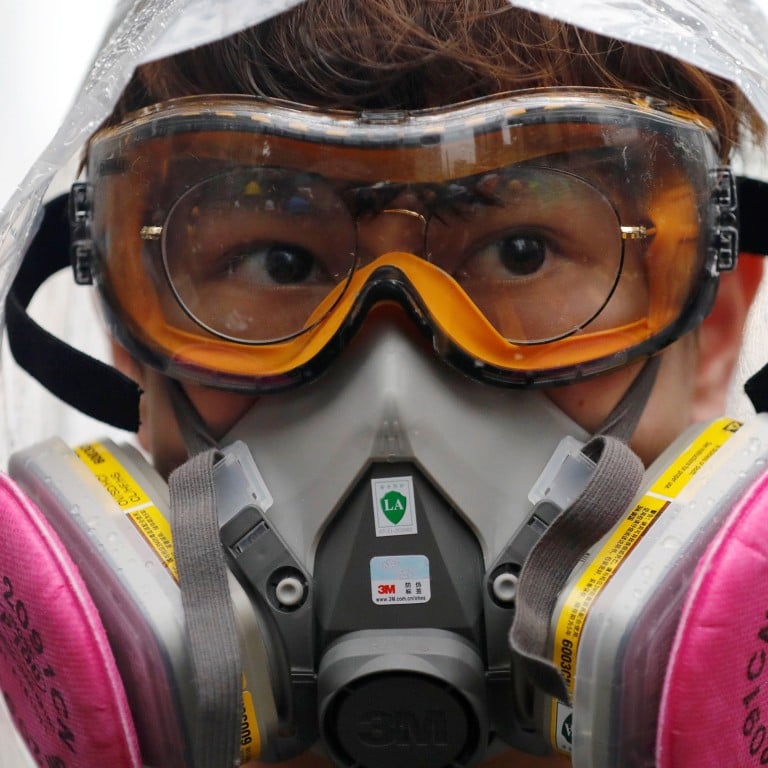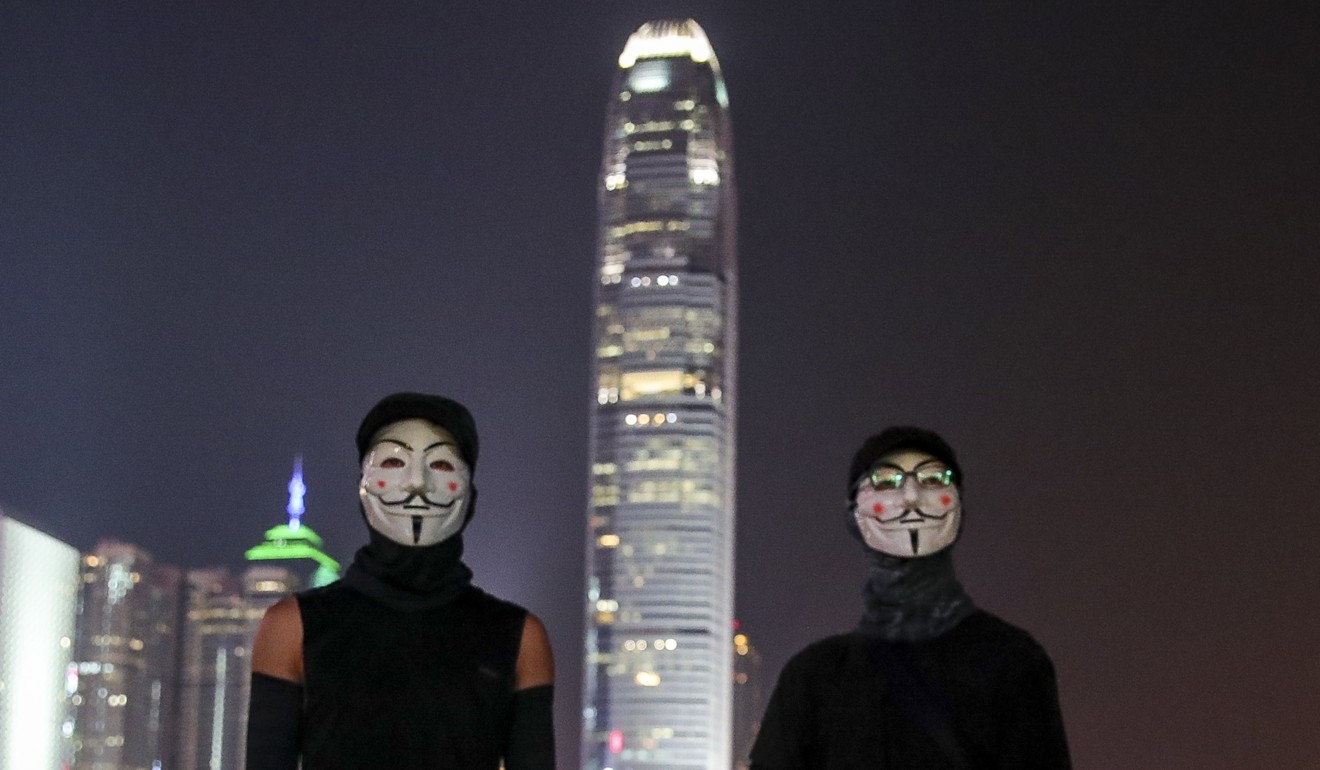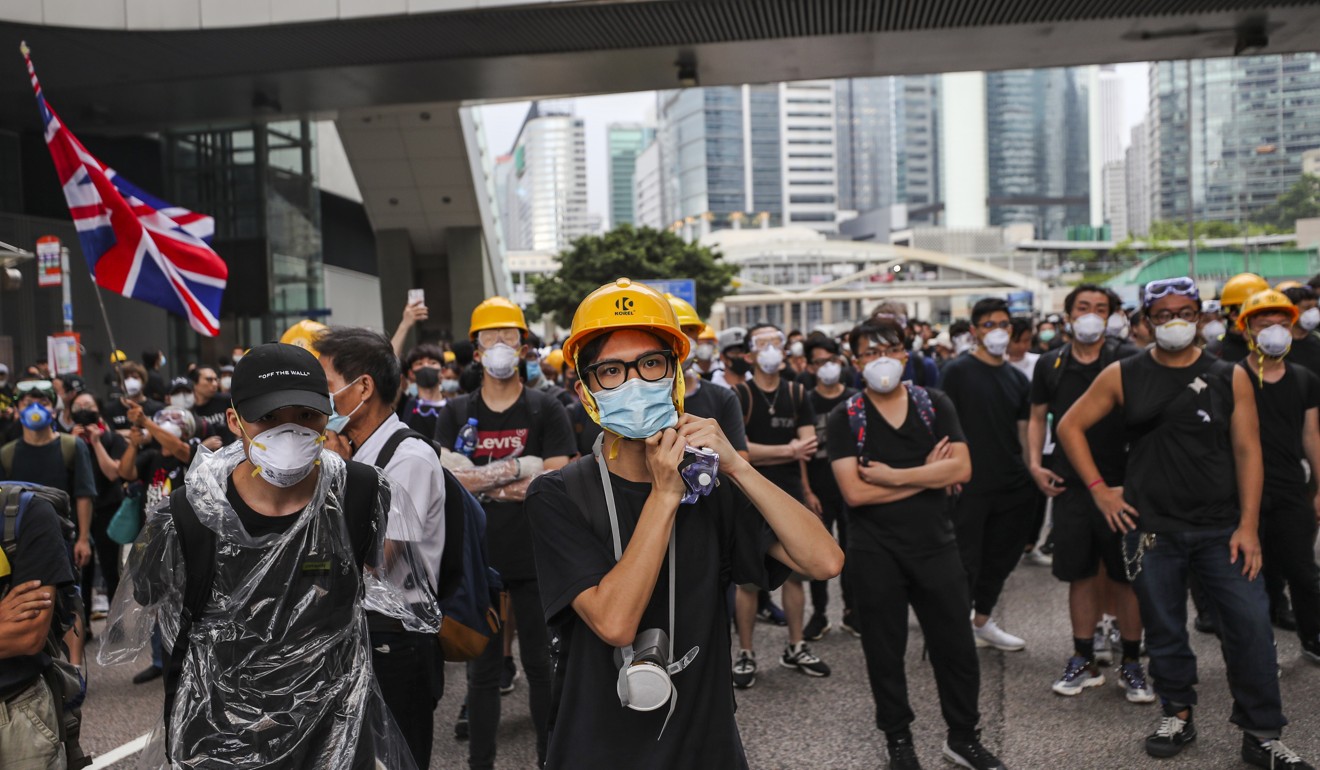
Hong Kong government to announce new law banning masks during public assemblies in bid to end months of protest violence
- Source confirms city leader Carrie Lam’s de facto cabinet will convene a special meeting on Friday
- If the Executive Council approves the plan to enact the anti-mask law, the government will make an announcement after the meeting
Hong Kong’s embattled government is set to announce plans on Friday to ban people from wearing masks at public assemblies, as it struggles to get a grip on protest violence spiralling out of control, sources have told the Post.
Chief Executive Carrie Lam Cheng Yuet-ngor’s administration, under mounting pressure from its political allies to put a stop to nearly four months of anti-government protest violence, is expected to impose the ban through legislation by invoking a tough, colonial-era emergency law that has not been used in more than half a century.
Lam would hold a special meeting of her de facto cabinet, the Executive Council, on Friday morning before announcing the ban, according to sources on Thursday.
Prior approval by city’s legislature is not required, and it will only be able to amend or strike down the law after implementation.
Legal experts were quick to warn that invoking the emergency law would destroy due process and pave the way for more draconian regulations.
While opposition lawmakers warned that the mask ban would further polarise society, pro-establishment politicians welcomed it, suggesting it would show the city leader’s determination to curb chronic violence.
From streets to courts, experts say anti-mask law would be tough to enforce
The Emergency Regulations Ordinance, introduced in 1922, grants the city’s leader the authority to “make any regulations whatsoever which he [or she] may consider desirable in the public interest” in case of “emergency or public danger”.
The last time the ordinance was invoked was back in 1967, when Hong Kong was racked by citywide leftist riots.

If approved, the new law would take effect within a short time, one source said, as it had become a matter of urgency after radical activists marred China’s National Day celebrations on October 1 with a violent rampage across Hong Kong, which led to the first case of police shooting and wounding a protester using live ammunition.
“We cannot wait for the Legislative Council, which will only meet on October 16 at the earliest,” the source said.
Another source said the new law would clearly spell out the circumstances under which people would be banned from wearing masks at protests.
“The law will not impose a blanket ban on wearing masks and there will be exemptions, such as wearing surgical masks for medical reasons,” the source said.

Pro-Beijing lawmaker Elizabeth Quat, from the Democratic Alliance for the Betterment and Progress of Hong Kong (DAB), announced on Thursday the founding of a concern group to push for the anti-mask law, even as news of the impending ban was leaked to the media.
“As a lawmaker, I always believe legislation should be the last resort,” Quat said. “But at this critical moment, I believe an anti-mask law is one of the feasible ways to curb violence. There is no painless solution for now.”
The DAB suggested the government follow the model used by Canada, where the wearing of masks during riots or unlawful assemblies carries a maximum prison sentence of 10 years.
But a third source told the Post that Hong Kong’s anti-mask law, which was likely to be gazetted on Saturday, would entail a jail term of up to one year, or a fine of HK$25,000. It would apply to lawful assemblies as well.
Quat admitted that enforcing the new law would be easier said than done, but she likened it to the prohibition of drugs, saying, “That doesn’t mean no one will take drugs … but it will strengthen the deterrent effect and assist law enforcement in terms of burden of proof.”
Two major events cancelled in Hong Kong because of anti-government protests
Earlier, Hong Kong’s largest police group, the Junior Police Officers’ Association (JPOA), urged the government to adopt tougher measures by invoking the Emergency Regulations Ordinance, or impose a curfew under the existing Public Order Ordinance, to empower the thinly stretched force to better tackle the escalating social unrest.
JPOA chairman Lam Chi-wai said he supported the anti-mask law as it would give officers legal justification for handling masked protesters, although it could be challenging.
“It would be very irresponsible not to introduce the law just because police might experience difficulties while on duty,” he said.
One of Lam’s advisers in the Executive Council, former Bar Association chairman Ronny Tong Ka-wah, said while he still had reservations about invoking emergency powers, the anti-mask law could demonstrate the government’s determination to curb violence.
“If we do nothing, some would think the government is incapable and has no will to solve the crisis,” he said.
Tong revealed there had been calls for the government to invoke emergency powers to allow police to detain those arrested for up to 96 hours, from the current 48 hours – working in tandem with the anti-mask law, which was likely to see large numbers being detained.
Tian Feilong, a law professor at Beihang University in Beijing, agreed that the use of the emergency law would signify an escalation of official efforts to end the protests.
But legal sector lawmaker Dennis Kwok, of the opposition Civic Party, said: “Using the emergency law to make an anti-mask regulation will be the first step of turning Hong Kong into an authoritarian society ... It will allow the executive branch to erode the people’s freedoms without the legislature’s monitoring.”
Democratic Party chairman Wu Chi-wai agreed it would set a bad precedent.
“The government is just sweeping its problems under the carpet,” he said.
Jimmy Sham Tsz-kit, convenor of the Civil Human Rights Front, which has organised the biggest mass rallies since they were first triggered in June by the government’s now-withdrawn extradition law, warned that the mask ban would not stop people from taking to the streets.
“Repression will only make people more flexible and unpredictable when they protest,” he said.
At least 15 countries in North America or Europe have imposed legislation banning people from wearing masks, including the United States, Canada, Germany and France.
Additional reporting by Alvin Lum, Gary Cheung and Zoe Low


